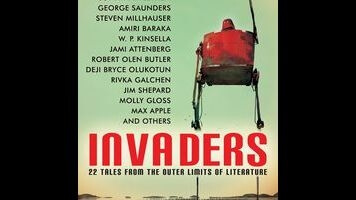Far from feeling like an assemblage of writers dabbling in the literary equivalent of baseball pros trying their hands at hockey, Invaders is a playful and imaginative exploration of what it means to write in the field of science fiction. The stories within contain a broad array of styles and narrative topographies; some of them merely utilize tropes or fanciful conceits as the background folderol to a more humanistic tale of love or pain, while others incorporate deep sci-fi premises in ways that suggest as profound an investment in the genre’s possibilities as an Iain Banks or a Charles Stross. And it’s a usefully diverse range of entries: Not all stories are equally effective, which is to be expected, but taken together, they illuminate the breadth of scope among authors not known for the form and the strategies they use to pursue these far-flung ideas.
The through-line—what does it look like when authors not generally known for sci-fi tackle the genre?—ends up unexpectedly revealing a common fault line: the gap between hard sci-fi and soft. The stories in Invaders overwhelmingly skew to the latter, but contrary to the fears of those critics Weisman so strenuously works to placate, these narratives are no less inventive, no weaker in premise or execution, than experienced practitioners of rigorous adherence to scientific fact. If anything, they demonstrate a willingness to explore and tease at the boundaries of the label, or blur them altogether.
This should be expected from some of these authors. Katherine Dunn, George Saunders, and Jonathan Lethem have all explored aspects of the fantastical—albeit in stylistically far-flung ways—and unsurprisingly, their stories are among the best ones in Invaders. Lethem’s “Five Fucks” is brilliant, the story of a toxic couple who literally remake and compress the universe each time they have intercourse. Saunders’ contribution, “Escape From Spiderhead,” is searing satire, sending up the ethics of medicinal psych drugs while saying something potent about the nature of desire, love, and even rudimentary decision-making. Dunn’s “Near-Flesh” closes the book, and in her inimitable style, addresses the unsettling and Cronenberg-like question of whether flesh—even simulated flesh—is a threat or a promise to our relationships with AI.
But the other authors here submit intriguing and compelling tales of their own. Brian Evenson’s “Fugue State” is a cool and unsettling story about a plague that progressively strips humans of their memory, their reasoning, and finally, perception itself. It’s one of the longer pieces, but it never stops chewing on your brain. Molly Gloss offers a quiet and naturalistic narrative about alien contact, like a genteel fusion of Louise Erdrich and Ursula K. Le Guin. The standard pluses and minuses of a compilation apply—there are lesser stories, but even they add to the range of ideas, and are over quickly enough—and the hook of watching more traditional storytellers splash about in the weird end of the pool makes for a satisfying overall experience. No one’s reinventing the wheel, but they are sending it leapfrogging through space-time.


 Keep scrolling for more great stories.
Keep scrolling for more great stories.